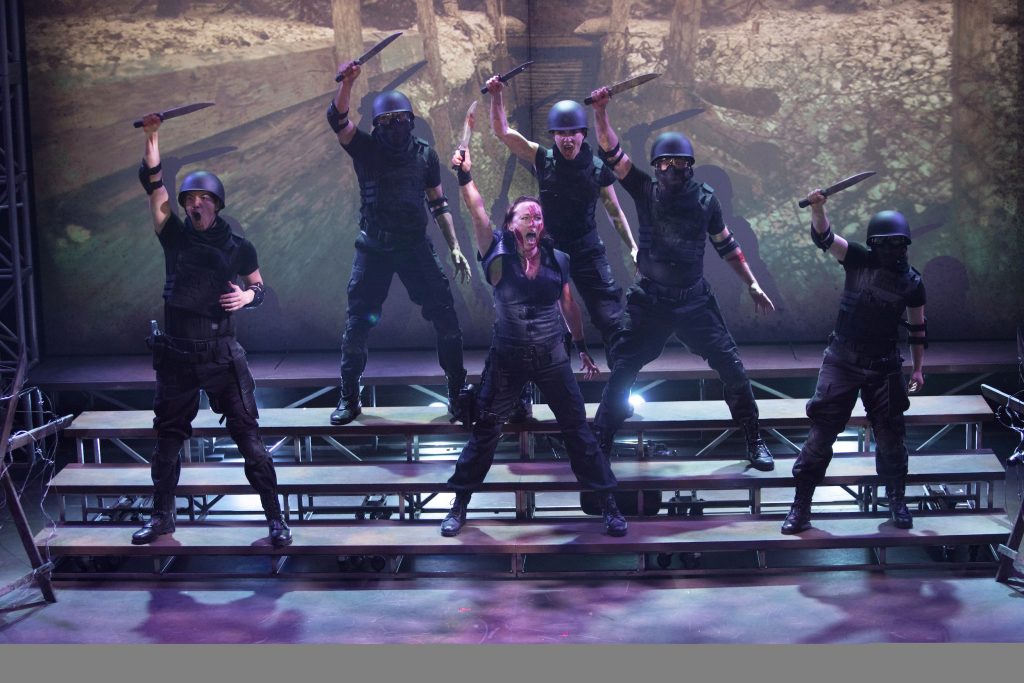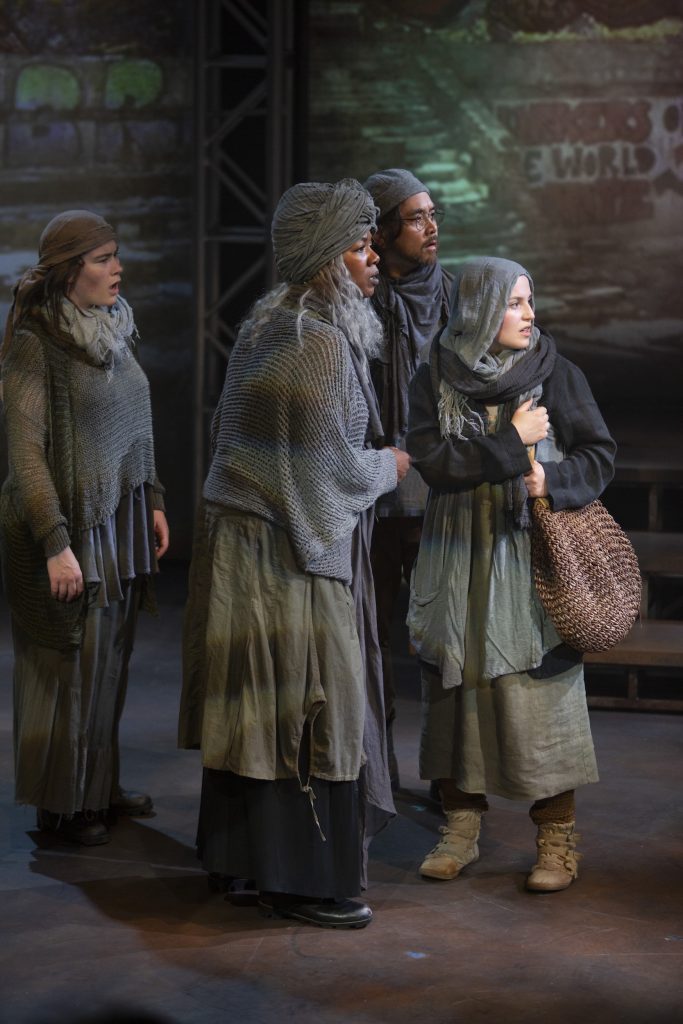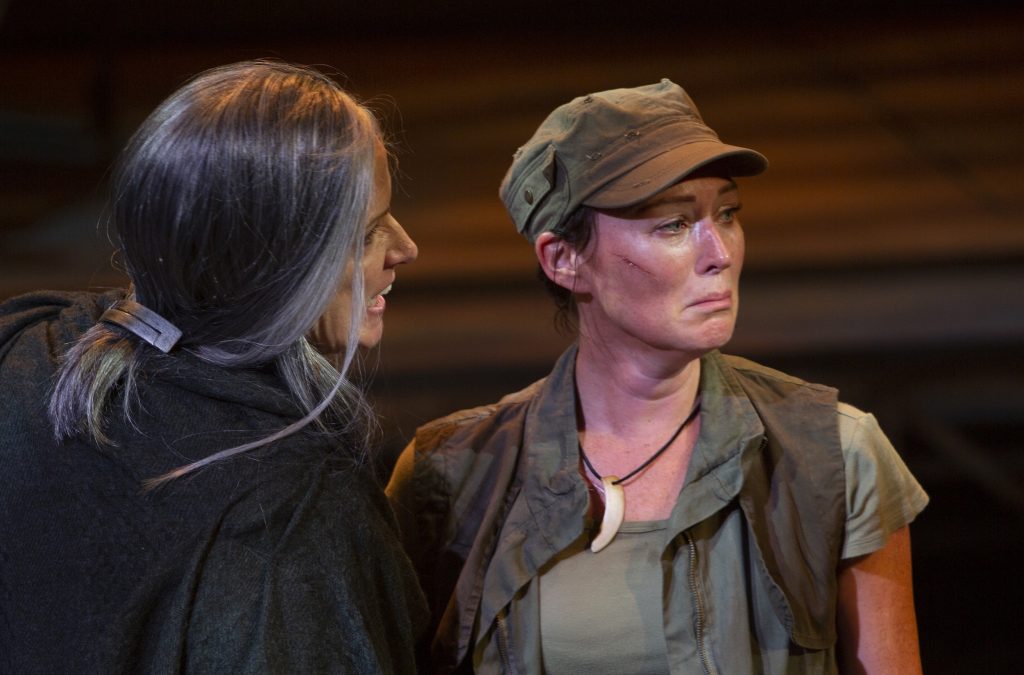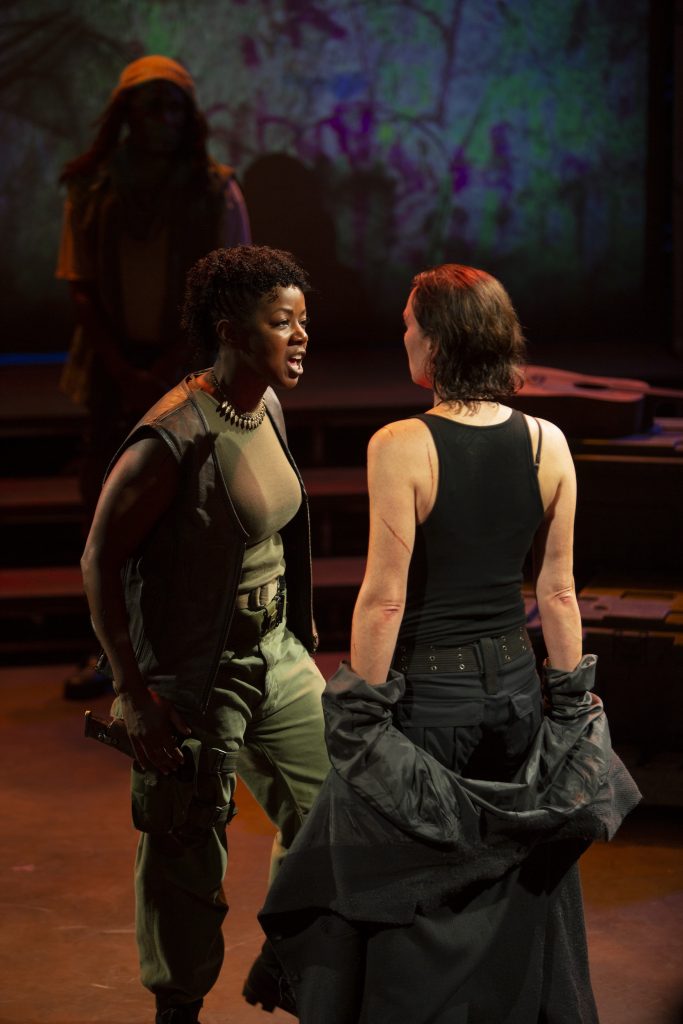
Credit: Emily Cooper
At Bard on the Beach until September 21, 2019
Tickets from $26 at 604-739-0559 or bardonthebeach.org
Posted August 26, 2019
Under Dean Paul Gibson’s direction and with the incomparable Moya O’Connell cross-gendered in the lead role, the opening scene of Coriolanus is the most breathtaking and blistering ever seen on either of the Bard on the Beach’s stages. In the role of Caius Martius – as Coriolanus was known before sacking the city of Corioles – O’Connell is a ruthless, one-person killing machine; a whirling dervish of a soldier slicing, stabbing, thrusting, slashing all that come at her with knives and swords in hand. Fight choreography by Robinson Wilson is a murderous ballet: violent, brutal yet somehow beautiful in its execution. The stage is set for tragedy.

Set design: Pam Johnson
Credit: Tim Matheson
But it’s a curious tragedy: our feelings about Coriolanus are initially ambiguous. A warrior hero who has suffered more than two dozen wounds in wars for Rome, yet she mocks the common people, calling them “dissentious rogues”, “scabs” and “curs”. “ I do despise them”, she says. When the plebeians rally for representation in the senate, Coriolanus cries, “Hang ‘em”. So, for whom does Coriolanus fight if not for all citizens of Rome? The patricians? For glory?
As the play opens, Coriolanus has just returned in triumph from Corioles. Menenius (Shawn Macdonald), a Roman patrician, encourages a reluctant Coriolanus to run for political office. She is opposed by two conspiring tribunes Sicinius (Craig Erickson) and Brutus (Praneet Akilla) who fear Coriolanus will have too much power. The candidate must appear before the people, in all humility, and plead for support; but when the conspirators remind the people of Coriolanus’s abhorrence of them, the rabble scream for her execution. Reminded of her heroism, however, the people agree to the lesser punishment: banishment.
Broken and enraged, Coriolanus leaves Rome and goes to her arch-enemy Aufidius (Marci T. House), suggesting they join forces and destroy Rome together.

Costumes: Barbara Clayden
Credit: Tim Matheson
Regardless of Coriolanus’s cold-blooded, murderous character, we find a grudging admiration for her: she’s resolute, fearless, unwavering and clear-headed. Her animosity toward Rome’s commoners is, to some extent, well-founded. While she goes to war, risks her life over and over, they sit safely at home letting others bleed and die for them. They waffle, they are easily swayed. First they proclaim her as a hero; next they are screaming for her death.
So for whom does Coriolanus risk her life again and again? Or is she just a monster, “a thing of blood”?
In this production, her motivation appears chiefly to be to garner the love and respect of her mother, Volumnia (Colleen Wheeler). Casting a woman as Coriolanus adds complexity to both characters: the mother/daughter relationship swings wildly between love and anger, pity and scorn, fury and affection. Volumnia rails at Coriolanus when, as a candidate for consul, Coriolanus refuses to humble herself and woo the common people. But one of the most affecting scenes is Coriolanus’s departure into exile, leaving Volumnia to grieve. Mother and daughter are both devastated.

Credit: Tim Matheson
But Volumnia, too, is suspect. Is she more Lady Macbeth than Lady Macbeth? Does her own pride put Coriolanus at risk? Colleen Wheeler brings such intensity, such potency to the role, there are times when the play seems Volumnia’s.
Marci T. House, as Aufidius, is a powerful foil for O’Connell – matching her, at times, fury for fury. As the would-be peacemaker, Shawn Macdonald is the calm voice of reason.

Credit: Tim Matheson
The production is stunningly designed: simply staged by Pam Johnson with vast projections by Jamie Nesbitt against large, movable panels. Images of Roman ruins vie with modern buildings carry the play from past to present. Barbara Clayden’s costumes from rags to military uniforms, suits to army fatigues suggest anywhere, anytime. Alessandro Julian’s score adds elements of tension and impending disaster to the action.
Coriolanus is definitely not for the faint of heart; there’s blood, there’s violence, there’s betrayal. But it’s a magnificent production of a seldom-seen play.
Sold out before opening; seven additional performances have been added. Be quick or be sorry.

